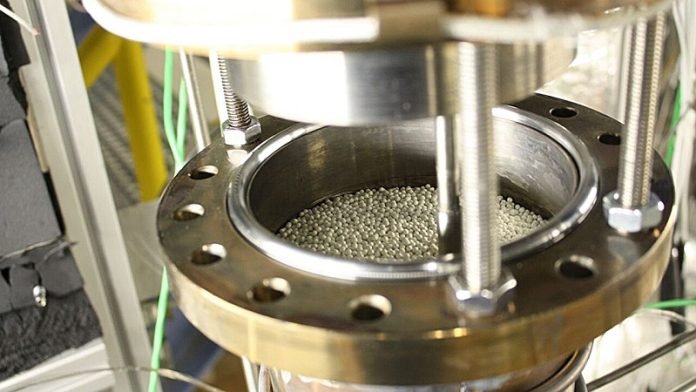
Researchers at the Karlsruhe Institute of Technology (KIT) are pioneering a groundbreaking high-temperature heat storage system that could dramatically change how industries use energy.
By utilizing liquid-metal technology, this system can efficiently store and manage heat, potentially reducing reliance on fossil fuels.
Industries like steel, concrete, and glass manufacturing are some of the most energy-intensive, consuming over 20% of Germany’s total energy, mostly from fossil fuels.
The KIT team’s development aims to store heat generated from renewable energy sources, making industrial processes more sustainable and less dependent on fluctuating energy supplies.
From April 22 to 26, 2024, the team will showcase a model of their innovative system at the Hannover Messe, an international trade fair for industrial technology.
This new system focuses on using a mixture of lead and bismuth metals, which are capable of being heated to over 700°C.
What makes liquid metals stand out is their ability to conduct heat 100 times more efficiently than traditional materials used in other high-temperature storage systems, such as liquid salts or hot gases.
Typically, pilot plants utilize these salts to store heat at around 550°C, and some have used gases to reach even higher temperatures.
However, the heat transfer efficiency of these gases to the storage materials—like steel, volcanic rock, or slag—has been less than ideal. In contrast, the lead-bismuth mix in the KIT system flows through ceramic beads, transferring heat more effectively and storing it until needed.
This capability is particularly beneficial when energy from renewable sources like solar or wind is plentiful but demand is low. The stored heat can then be used later, when energy costs rise or more power is necessary for continuous industrial operations. This method offers a practical solution to balance supply and demand, ensuring energy is available at the right temperature for industrial use without wastage.
The system also features a unique loop setup within a steel tank where the “cold” liquid metal is recirculated through the ceramic beads, reheating in the process. This cycle has been demonstrated to work effectively at KIT’s specialized liquid-metal laboratory, KALLA.
So far, this type of liquid-metal heat storage system is rare globally due to logistical challenges. However, KIT’s researchers have managed to design a system with a significant capacity of 100 kilowatt-hours of heat, tested up to 400°C in laboratory settings. This model, although only half the size of the actual system at KIT, will be presented at the Hannover Messe to illustrate its potential and functionality.
Dr. Klarissa Niedermeier of KIT believes that this technology not only showcases the effective use of renewable energy in industrial settings but also highlights a significant step towards defossilizing the industry.
By reducing fossil fuel dependency, this system could help mitigate environmental impacts and promote sustainable energy practices across various sectors.



